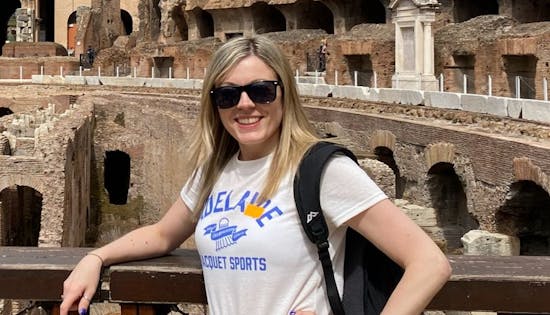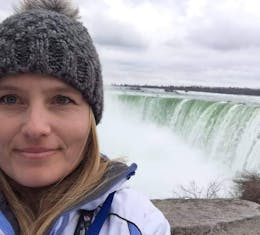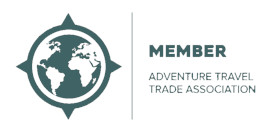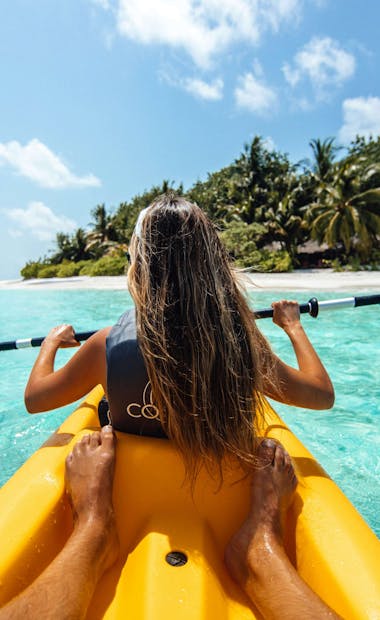Vietnam Tours
Hike through the hills, sail along the coast and try famous street food on spectacular tours through Vietnam. Best price guaranteed.
Popular tours
- Save27%
 View Tour
View TourVietnam: Historic Cities & Halong Bay Cruising - 12 Days
- Ho Chi Minh City to Hanoi
- Age group: 18 - 39
- Max group size: 18
Was:£649From£477 - Save17%
 View Tour
View TourEssential Vietnam - 12 Days
- Hanoi to Ho Chi Minh City
- Age group: 18 - 35
- Max group size: 16
Was:£620From£516 - Save22%
 View Tour
View TourVietnam Real Food Adventure - 12 Days
- Hanoi to Ho Chi Minh City
- Age group: 15 - 99
- Max group size: 12
Was:£1,540From£1,207 - Save22%
 View Tour
View TourCycle Vietnam - 15 Days
- Hanoi to Ho Chi Minh City
- Age group: 15 - 99
- Max group size: 16
Was:£1,890From£1,482 - Save17%
 View Tour
View TourEssential Vietnam & Cambodia - 17 Days
- Hanoi to Bangkok
- Age group: 12 - 100
- Max group size: 16
Was:£1,829From£1,524 - Save22%
 View Tour
View TourClassic Vietnam: Hanoi to Ho Chi Minh City - 10 Days
- Hanoi to Ho Chi Minh City
- Age group: 12 - 100
- Max group size: 16
Was:£899From£705
Discover Vietnam trips with the Adventure People
With its stunning landscapes, compelling history and some of the best food in the world, Vietnam has become one of the hottest places to visit in Southeast Asia. Our selected Vietnam group tours are the perfect way to see it!
There are so many adventures you can have here. Cycle through the countryside and discover hidden gems along the way or hike in the magnificent hills and stay with the locals to taste unbeatably authentic Vietnamese food. Visit the big cities of Ho Chi Minh City and Hanoi to sample amazing street bites between visiting temples.
If you're a history buff, visit the famous Cu Chi Tunnels used by locals as shelter during the Vietnam War. Next, head to Sapato to explore the rice fields, fishing villages and floating markets along the Mekong Delta.
You’ll take boat rides and overnight trains and see beaches unlike anything you’ve seen before. Browse our partners' incredible adventure tours to Vietnam or get in touch with our travel experts for a tailor-made trip!
Will I need a visa to travel to Vietnam?
You may not need a visa for your Vietnam tour package if it's a short stay, but there are some exceptions and different options available:
Visa exemption: Citizens of certain countries are exempt for short-term stays typically ranging from 14 to 90 days, including the UK, some Southeast Asian countries, South Korea, Japan, Russia and several European countries. Check Vietnam's entry requirements for UK citizens.
Visa on Arrival (VOA): This option allows you to get a visa upon arrival at select international airports in Vietnam. It requires pre-arrangement through a visa agent or tour operator before your trip. Check the eligibility and application process for VOA, as it may not be available for all nationalities.
E-Visa: Vietnam also offers an e-visa system, which allows travellers from certain countries to get a visa online before their trip. The e-visa is valid for a maximum of 90 days and can be for single or multiple entry. The application process is straightforward, and the e-visa is directly linked to your passport.
Embassy/Consulate Visa: Another option is to apply for a visa directly at the Vietnamese embassy or consulate in your home country. This allows you to get a visa sticker or stamp in your passport before travelling.
Visa rules can change, so check with the nearest Vietnamese embassy or see official government websites to confirm the latest requirements for your nationality and travel plans.
When's the best time to visit Vietnam?
The best time for trips to Vietnam depends on the regions you plan to explore and the activities you want to try. Vietnam has a diverse climate, and different areas experience varying weather patterns throughout the year. Here's a general breakdown of the seasons:
Northern Vietnam (Hanoi, Halong Bay, Sapa):
Spring (March to April) and autumn (September to November) are considered the best times to visit Northern Vietnam. The weather during these seasons is generally mild and pleasant, with less rainfall and comfortable temperatures.
Central Vietnam (Hue, Hoi An, Da Nang):
Central Vietnam has distinct wet and dry seasons. The best time to visit this region is from February to April when the weather is relatively dry and temperatures are moderate. Avoid the typhoon season if possible, which typically occurs from October to December.
Southern Vietnam (Ho Chi Minh City, Mekong Delta):
Southern Vietnam has a tropical climate with two main seasons: dry (November to April) and rainy (May to October). The dry season is generally considered the best time to visit due to lower rainfall and more comfortable temperatures.
Some destinations within these regions have unique microclimates, so check weather conditions and regional climate for your intended stops.
Another factor to consider is the popularity of tourist sites during peak seasons. Some attractions, such as Halong Bay and Hoi An, can get extremely busy during holiday periods. If you prefer fewer crowds, consider visiting during shoulder seasons.
Ultimately, the best time to see Vietnam depends on your preferences and the experiences you're looking for. Whether you want to explore bustling cities, relax on pristine beaches, trek in the mountains or immerse yourself in cultural festivals, consider weather patterns and regional characteristics to plan your ideal trip.
What are the must see destinations in Vietnam?
It's a country rich in natural beauty, cultural heritage and historical significance. Here are some of the top destinations to consider as part of your Vietnam tour holiday:
- Hanoi: The capital city is a vibrant blend of history and modernity. Explore the charming Old Quarter, visit iconic landmarks like the Ho Chi Minh Mausoleum and Temple of Literature, and take in the bustling street life and delicious street food.
- Halong Bay: A UNESCO World Heritage Site, Halong Bay is renowned for its breathtaking limestone karsts and emerald waters. Go on a cruise, kayak through the towering rock formations and witness the enchanting beauty of this natural wonder.
- Hoi An: This ancient town in central Vietnam is another UNESCO World Heritage Site, known for its well-preserved architecture and lantern-lined streets. Discover the Japanese Covered Bridge, stroll along the Thu Bon River and immerse yourself in the vibrant atmosphere.
- Hue: The former imperial capital of Vietnam is home to the Imperial City, yet another UNESCO World Heritage Site. Explore the Citadel and visit the elaborate royal tombs.
- Ho Chi Minh City: Formerly known as Saigon, this bustling metropolis in southern Vietnam offers a vibrant mix of modernity and tradition. Visit the historic Reunification Palace and explore the bustling Ben Thanh Market.
- Mekong Delta: Explore an intricate maze of rivers, canals and floating markets. Cruise along the waterways, visit local villages and see a unique way of life in this fertile region.
- Sapa: Nestled in the northwest mountains, Sapa is known for its stunning rice terraces and remote communities. Take treks through the picturesque landscapes, interact with local tribes and enjoy the fresh mountain air.
- Ninh Binh: Experience the natural beauty of a place often referred to as "Halong Bay on land". Take a boat ride through the Trang An Landscape Complex, explore ancient temples and enjoy the serene countryside.
- Phu Quoc: For beach lovers, Phu Quoc Island is a tropical paradise with pristine white sandy beaches, crystal-clear waters and lush forests. Relax on the sand, go snorkelling or diving, and indulge in fresh seafood.
- Dalat: Located in the central highlands, Dalat offers a refreshing escape with its cool climate and picturesque landscapes. Explore the French colonial architecture, visit the colourful flower gardens and enjoy outdoor activities like hiking and biking.
These destinations showcase the diversity available on trips to Vietnam, but the country still has much more to offer. Whether you're interested in history, nature or cultural experiences, find what interests you!
What is the local currency in Vietnam, and can I use credit cards?
The local currency is the Vietnamese dong (VND). It's a good idea to have some with you for small purchases, such as taxis, street vendors and local markets.
You can exchange your currency upon arrival at international airports, in banks or at authorised currency exchange counters. ATMs are also widely available in cities and tourist areas, allowing you to withdraw Vietnamese dong directly from your bank account, though they may charge fees.
Credit cards such as Visa and Mastercard are accepted in larger hotels, restaurants and shops in major cities like Hanoi and Ho Chi Minh City. Some businesses may also accept American Express and JCB cards, but they're less common.
Before your tour through Vietnam, tell your bank or credit card company about your plans. This should stop any potential issues with your cards being blocked due to suspicious transactions.
Is Vietnam a good family holiday destination?
Yes, it can be an excellent family holiday destination with plenty of attractions and experiences for all ages! Here are some reasons why:
- Cultural experiences: Vietnam is a country with a deep heritage and diverse traditions. Exploring historical sites and local villages and joining cultural activities provide valuable learning opportunities for children and adults alike.
- Natural beauty: From the stunning landscapes of Halong Bay and Sapa's terraced rice fields to the beautiful beaches, Vietnam offers a range of great spots for outdoor adventures like boat cruises, hiking, biking and kayaking. National parks offer educational experiences about Vietnam's wildlife and ecosystems.
- Delicious food: Vietnamese cuisine is renowned for its intense flavours and variety. You can try different dishes together including fresh spring rolls, pho (noodle soup) and banh mi (filled baguettes). Food tours and cooking classes can be fun for everyone!
- Friendly locals: Vietnamese people are warm and helpful towards visitors, creating a welcoming atmosphere for children.
- Family-friendly accommodation: Vietnam offers a range of family-friendly hotels and resorts with amenities such as swimming pools, kids' clubs, and spacious rooms or villas.
- Cultural festivals: Your gang can experience exciting events at certain times of year, such as the Lunar New Year (Tet) celebrations, offering a unique insight into Vietnamese traditions.
- Safety: Vietnam is generally considered safe for travellers. As with any destination, it's important to use common sense such as staying aware of your surroundings.
When planning a family trip to Vietnam, consider the interests and ages of your children and choose activities and destinations that cater to their needs. It's also a good idea to plan a balanced itinerary with a mix of cultural experiences, outdoor adventures and relaxation time.
What about Vietnam tour holidays for solo travellers?
Here are some reasons why Vietnam adventure tours are great for solo travellers too:
- Warm hospitality: The locals are often eager to share their culture, recommend experiences and help with any questions or concerns.
- Safety: It's generally a safe country for all travellers, giving you reassurance whether travelling alone or as part of a group tour with our trusted providers.
- Affordable travel: It's relatively affordable compared to other places. Accommodation, food, transport and activities can all be budget-friendly, allowing you to make your money and travels go further.
- Varied experiences: Whether you're interested in history, nature, adventure, food or relaxation, you'll find plenty of options to choose from. Take a boat cruise, hike in national parks, join a cooking class, explore local markets or simply unwind on beautiful beaches.
- Easy transport: Vietnam has a well-developed transportation system that makes it easy to get around. Buses, trains and domestic flights connect major cities and tourist destinations, allowing for simple, affordable travel between different regions.
- Opportunities to meet other travellers: You'll have chances to connect with fellow adventurers in hostels, on tours or through online communities, helping you make new friends and share experiences.
Is Vietnam a safe destination?
The vast majority of Vietnam trips are trouble-free, but it’s important to be vigilant and take standard precautions.
Vietnamese law requires you to always carry a photo ID. Take a copy of your passport and leave the original in your accommodation, ideally in a safe.
Try to carry minimal items with you. If you have a bag, wear the strap over your shoulder and away from the road to deter thieves on motorbikes from snatching it.
Take extra care at night and in isolated areas.
Be careful travelling at night by bicycle or motorcycle, especially if you’re alone. Stick to well-used, well-lit roads and carry a personal alarm if possible.
Avoid placing bags in the front basket of bicycles.
Be wary of pickpockets, especially on public transport and in crowded areas.
The emergency numbers are 113 for police, 114 for fire, and 115 for an ambulance.
Will I need any vaccinations for a Vietnam tour holiday?
You may be advised to have certain vaccinations before travelling to protect your health and prevent the spread of diseases. The types you need may vary depending on your current health status, previous immunisations, the duration of your stay and the areas you plan to visit. Speak to a healthcare professional or travel medicine specialist at least 4-6 weeks before your trip to discuss your needs and the latest recommendations for Vietnam.
While not an exhaustive list, common vaccinations recommended for this part of the world include:
- Routine vaccinations: Ensure you're up to date on measles-mumps-rubella (MMR), diphtheria-tetanus-pertussis, varicella (chickenpox), polio and influenza.
- Hepatitis A: Recommended for all travellers to Vietnam as hepatitis A can be contracted through contaminated food or water.
- Typhoid: Typhoid fever can be also transmitted through contaminated food or water. This vaccine is especially recommended if you plan to visit smaller cities or rural areas.
- Hepatitis B: A viral infection that can be contracted through sexual contact, contaminated needles or blood products. The vaccine is recommended for travellers who may have intimate contact with locals or require medical procedures.
- Japanese encephalitis: A mosquito-borne viral disease usually contracted in rural areas. The vaccine may be recommended if you're travelling long-term, visiting countryside spots or taking part in outdoor activities.
- Rabies: This vaccine is advisable if you plan to spend a lot of time outdoors, work with animals or travel to remote areas where access to medical care may be limited.
- Tetanus: Recommended if you plan to be outdoors a lot or may encounter situations where injuries are possible.
How does the rooming work on Vietnam tours?
Small group tours in Vietnam typically involve a set itinerary where you travel with a group of fellow travellers and a tour leader/guide. Accommodation can vary depending on the tour you choose. Here are the main options:
Shared rooms: Most tours include shared accommodation to keep costs down and encourage interaction among group members. This means you'll be paired with another member of the same gender and age range. It's best to tell the tour provider about your preferences when booking.
Single supplement: If you prefer privacy, you may be able to pay a single supplement fee. Single supplements can vary in cost and availability, so make sure to ask before booking your Vietnam tour package.
What is the food like in Vietnam?
Vietnamese cuisine is renowned for its vibrant flavours, fresh ingredients and delicate balance of textures. It's a delightful blend of influences from neighbouring countries including China, Cambodia and Thailand but maintains a distinct identity.
Here are some of the highlights to try on a tour through Vietnam:
- Pho: A tasty noodle soup that typically features tender slices of beef, chicken or tofu, aromatic herbs, rice noodles and a fragrant broth. It's often served with lime, bean sprouts, basil, and chilli, allowing you to customise the dish to your preference.
- Banh mi: Introduced during the French colonial period, this is a delicious sandwich consisting of a crusty baguette filled with savoury ingredients like grilled pork, pate, pickled vegetables, fresh herbs and a variety of sauces.
- Spring rolls: Fresh spring rolls, also known as summer rolls or salad rolls, are a popular Vietnamese appetiser. They feature translucent rice paper wrapped around a filling of fresh herbs, vermicelli noodles, shrimp, pork or tofu. They're often served with a dipping sauce.
- Bun cha: Originating from Hanoi, bun cha is a dish of grilled pork patties and sliced pork belly served with rice noodles, fresh herbs, and a sweet and tangy dipping sauce.
- Cao lau: A speciality of Hoi An, consisting of thick rice noodles, slices of juicy pork, bean sprouts, fresh herbs and crispy rice crackers, all topped with a savoury broth.
- Banh xeo: A crispy Vietnamese pancake made with rice flour, coconut milk and turmeric. It's typically filled with shrimp, pork, bean sprouts and green onions, and you tuck in by wrapping it in lettuce or rice paper with herbs and dipping it in a sauce.
- Seafood: With its long coastline, Vietnam offers an abundance of fresh seafood – from succulent grilled prawns and steamed fish to crab and squid.
- Coffee: Vietnam is known for its strong and aromatic coffee, typically served with condensed milk and enjoyed hot or iced.
- Tropical fruits: The warm climate allows for an abundance of sweet and juicy fruits such as mangoes, dragon fruits, lychees, pomelos and rambutans.
Vietnam is also known for its street food culture, and you can find an array of tasty and affordable dishes from food stalls and markets. Each region has its own specialities, making food a great way to experience the country's diversity.
Can I drink the tap water in Vietnam?
It's generally not recommended to drink the tap water. The quality can vary between regions, but while efforts have been made to improve water treatment systems in urban areas, it's still wise for visitors to rely on bottled water or other safe drinking sources.
Bottled water is widely available and affordable in Vietnam. If you prefer to purify water yourself, you can use methods such as boiling for at least one minute or using purification tablets or filters.
Additionally, be cautious when consuming beverages with ice or raw fruits and vegetables that may have been washed with tap water. Cooked foods and hot beverages carry less risk of contamination.
Are there any cultural norms in Vietnam I should follow?
Here are some tips to keep in mind on your Vietnam adventure tour:
Greetings: When meeting someone for the first time or in a formal setting, it's customary to greet with a slight bow or a handshake. Addressing people with their titles or appropriate honorifics (such as Mr., Mrs., or Miss) is also appreciated.
Respect for elders: Elders are highly valued in Vietnamese culture, and it's customary to address them with appropriate titles and show deference in your behaviour and language.
Modest clothing: Vietnamese society shares conservative values, particularly in rural and traditional areas. When visiting religious sites, it's important to dress modestly, covering shoulders, knees and cleavage. In general, it's advisable to dress respectfully in public places.
Removing shoes: It's common practice to remove your shoes when entering homes, temples, pagodas and certain restaurants or establishments. Look for cues such as a shoe rack or other shoes placed at the entrance.
Dining etiquette: It's polite to wait for the oldest or most senior person to start eating before you begin. Use chopsticks appropriately and avoid sticking them upright in your bowl as this is considered impolite. It's also customary to offer a toast ("chúc sức khỏe") before drinking alcohol.
Public displays of affection: The Vietnamese are generally warm and friendly, but public displays of affection such as kissing or excessive physical contact are not common or well-received, so it's best to show restraint.
Tipping: Tipping is not a traditional practice but has become more common in tourist areas. In restaurants, a service charge may be included in your bill. It's also customary to tip tour guides, drivers and hotel staff for exceptional service.
Temple etiquette: As well as dressing modestly and removing your shoes, follow any instructions or rules provided in sacred places such as refraining from loud talking or photography.
Helpful Information
Avoid tap water as much as possible and try to find filtered water either in hotels or ask your tour guide. It's also a good idea to avoid ice and peel fruit and vegetables before eating.
English is widely spoken especially in any tourist areas and the guides all speak English too of course.Tipping is always appreciated, you’ll know when. We would note, if you’re taking pictures of locals, especially in the tribal areas its courteous to ask permission and maybe give a donation.
Internet access is widely available in big cities and main tourist areas. Cities will also have internet cafes. But in rural areas this may not be the case.
Respect the local culture! Cover up if going to religious sites or buildings.
We recommend trying ALL THE FOOD you can! The food in Vietnam is a huge highlight so embrace it.
We try to ensure we work with the BEST local companies but remember, if you’re on a trip and don’t feel like an activity or continuing, you can stop. You don’t need to do anything you don’t want to!
Our guided adventures will take you to places well off the beaten track and provide experiences that most people just won’t get, with that in mind we encourage you to check out our growing selection! We have a lot of trips and you may find something you like but if not, please do make contact and we can always tailor make a trip for you.
Why book a Vietnam Tour with The Adventure People?
Why book with The Adventure People?
You may be thinking ‘why should I book with The Adventure People?’. Here are just some of the reasons we stand out:
The Best Value
Not only are our prices usually the best in the market but our leading service coupled with the financial protections we offer mean you won’t find better value anywhere else.
Your Dedicated Travel Expert
Our travel team is the best in the business and we’re not just saying that. The moment you make an enquiry we’ll pair you with your own dedicated expert who is on hand to answer your questions, look after your booking and make sure you have a fantastic time.
No Waiting Times
We only have one phone number with no automated services. When you contact us you’re straight through to a member of our team and a human!
Financial Protection
We are ATOL certified, members of ABTA and run a Trust account for our Vietnam tour packages ensuring you’re fully financially protected.
Flexible Payments
We offer low deposits and monthly payment plans at no extra cost.
Flights
We can add flights to any trip you book with us and we’re happy to help with Round The World tickets!
Accommodation
We work with wonderful accommodation providers and our team can quote almost any hotel in the world at the best prices.
Transfers & Extras
We can easily add airport transfers or extras to any booking. Our team will always quote the best possible price and be able to update your booking.
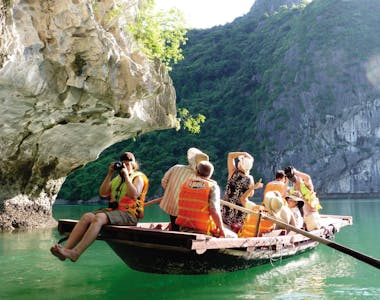
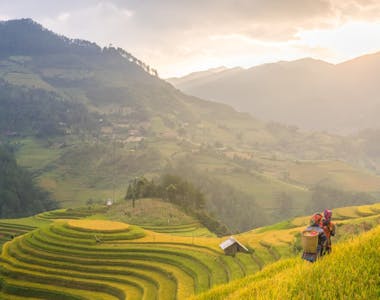
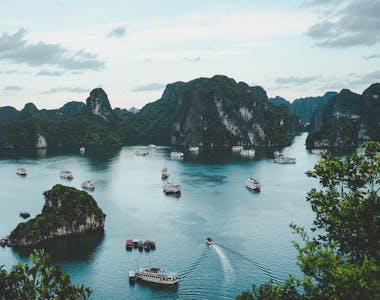
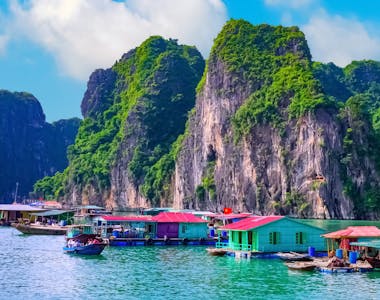

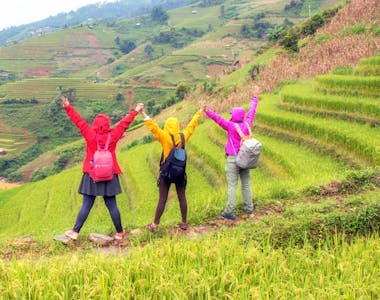
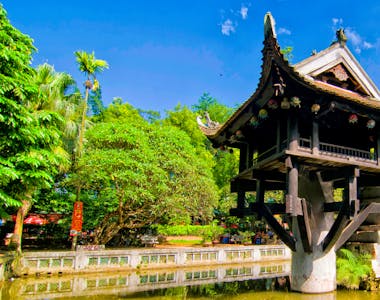
Book With Confidence
Monthly Payments
Spread the costs with no interest or additional fees
Best Price Guarantee
We won't be beaten on price. If you find this adventure at a lower price please get in touch!
Reserve now & pay later
Reserve your adventure today and pay later, free of charge
ATOL protected
Book with confidence
Hold your space today, for free
or book your trip with a deposit and then pay the rest in instalments.
Reserve your flights with us
Add flights to your booking and we'll take care of the rest. You'll get 24/7 support from our team & ATOL protection.
Speak to our experts
Call or email our expert team to find out more and help with ideas and planning.
